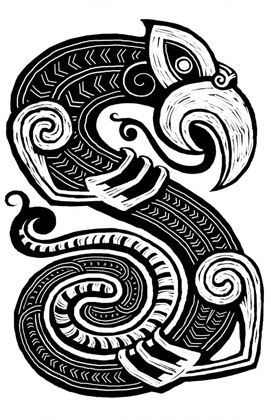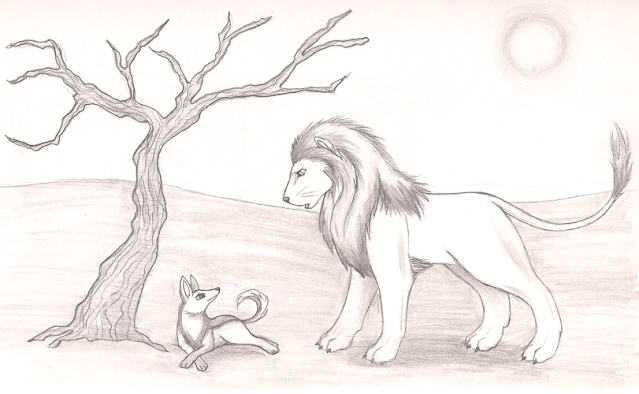Apera - The Wise One
The warriors kept themselves silently veiled behind either bush or tree, their weapons concealed. The evergreen forest was dense and very little light penetrated through the trees. A moa was busy pulling out and swallowing worms from a hole in the grass, unaware of the danger that lurked. Just then one of the warriors threw his spear and hit the moa in its side. The warriors waited for their target to fall and succumb to its wounds. They emerged from their hiding places when they felt it was safe and carried their kill back to their village with them. They were of the Ngati Haua tribe and the chief welcomed them back with the traditional welcome Haka to celebrate their successful hunt.
That night the hunt was celebrated at a
feast; a new hunter was to be picked to lead the tribe’s hunting team, a man
who scored a direct hit. The evening was filled with music and dance with poi balls and vibrant attire adorned by
both men and women. It was outside the marae
in which chief Aperahama of the
village along with the village elders and all members of the hunting party held
a meeting to select the new lead hunter; Atawahi
was the new lead hunter. Everyone in the village cheered as they welcomed the
news of his selection. All the men of the hunting group brandishing their
weapons, bowed before their chief, the village elders and their new leader
before returning to join the festivities.
During the feast, one of the hunters who
was part of the meeting, envied the new hunter. While he was proud of Atawahi and was happy for his new
position, he wondered why he was never chosen even though he was successful at
every hunt. “Do they not like me? Why am I not rewarded?” Even though he was
the youngest member of his group, there was no doubt that he was the most
successful. While his thoughts flowed, he was joined by his wife, Ahere and his two children Haki and Hauora. Ahere knew what
bothered her husband and felt his pain; today was yet another disappointing day
for him. His children hugged him and said “You’re still the best hunter daddy”.
When the feast was over, Ahere noticed
that her husband was still very preoccupied. “Take a walk by the sea tomorrow,
it is always calming”.
The following day, Apera walked down for what seemed like hours along the seaside. He
was familiar with every inch of the beach. Around noon, he sat under his
favourite Pohutakawa tree immersed in
his usual thought. He dreamed of becoming the lead hunter. He wondered why he
was never chosen. The waves, gently struck the shore before returning to the
sea. The trees and bushes shone bright green while the korus were still to unwrap. It just did not seem fair. All of a
sudden, a voice called out from the sea “What is it that bothers you, young one?”
Apera looked at the shallow waters where
gazing at him, was a Taniwha. Despite
his surprise, Apera felt a deep calmness within himself which prompted him to
share his feelings with the water being. “I am the most determined and
successful hunter of my tribe. However success eludes me and I am not
recognised. Why am I not chosen as the lead hunter?” “Search within yourself” said the Taniwha. “Appreciate what you are
blessed with. You are a skilled hunter, you have a loving family and what you
do not realise is you are a wise one. Of course you wish to be a lead of your
hunting group, that is but natural! Yet, your time to lead will come when the
time is right. You have much to learn as yet and to teach. Until then, treasure
and share what you have for this group for your skills and wisdom are of great
use to them”. His speech complete, the Taniwha
vanished back into the waters.
After his encounter with the Taniwha, Apera returned to the village,
feeling different. His obsessive ambition of becoming the lead hunter of his village
did not arouse as much interest as it did before. The next time that the party
went out for a hunt, Apera
accompanied them with enthusiasm and an energy that he had never felt before.
He seemed to enjoy watching the party and contributing to the hunt almost
effortlessly. He was happy to help wherever he was needed and realised that it
gave him more satisfaction than trying to be the best hunter. He also watched
the senior hunters on his team to learn from their experience and that gave him
a deep sense of gratitude.
Meanwhile, the neighbouring tribe Ngati Awa was in continuous conflict
with Apera’s tribe over territory.
Although there was enough land for both the tribes to co-exist in peace, the
Awa tribe threatened the Hauas every
now and then causing damage to life and belongings. Even though Apera participated in the tribal
conflict, he believed that there was a better way out of these conflicts. He
spoke to his village elders about the pointlessness of these conflicts which he
believed could be resolved quite easily. The elders were worried because the Awas were not easy to communicate with.
Any attempts to negotiate with them could make the conflicting situation worse.
However Apera was able to convince
the elders that he could easily reason with the Awas. He was willing to risk his life for the sake of continuing
peace and prosperity for his tribe. He decided to visit the Awas with his plan of sharing the land on
which both tribes lived and argued over. When he reached the Awa village, he
was attacked as expected but bravely fought off his persecutors and managed to
convey to them that he was there for a purpose. Soon the Awas realised what Apera
had come for, and took him to their elders. Apera
was successfully able to convince them that both tribes could live in peace and
invited the Awa elders to his village to talk to his elders in order to work
out a solution. In due course the two villages, began to co-exist without any
conflict whatsoever. The village elders lauded Apera’s efforts and recognised him for the wisdom and courage that
he had shown to achieve this result. Both tribes recognised his ability of not
only being a skilled hunter but also an able negotiator.
Apera
involved himself with the work at the marae,
helping to organise meetings and sort out matters or differences. The younger
men and children of the tribe often sought Apera’s
advice on various things such as weaponry, hunting and life skills. Apera spent time with the young people by
teaching them the secrets of nature as were taught to him by the elders. He
also spent time with children telling them about ancient legends and heroic
tales. He helped other members of his tribe to build homes, to heal illnesses
and keep a good spirit. He seemed to be joyful and energetic at all times and a
source of inspiration to all his tribes folk. Sometimes Apera
would choose not to go on a hunt and be there to welcome back his party by
participating in the welcome back haka.
He loved doing the haka as it gave
him pleasure to celebrate others’ success. As time went by, Apera also ventured out of the village
by himself to learn the different messages of nature to help himself and his
folk. Years passed with Apera
continuing his observances and one day, many years after Apera had met the Taniwha,
he and his hunting party were tracking another moa.
It was a fully grown male who was quite
aggressive, kicking or head-swashing at any hunter who got too close. It even
paid close attention to thick spots where it could smell out hunters. Then all
of a sudden, from above, fell a spear which hit the moa, causing it to collapse
to the ground, lifeless. Apera jumped
down from the branches that stretched above them. His companions swarmed around
him in delight. “That was a very clever tactic! It would have been impossible
to get this moa otherwise” yelled one of them.
That night, a grand party was held in the
village, to herald the arrival of the new hunting leader. Apera found himself in the same place and was received the same way
as the last lead hunter, his rank being bestowed upon by Aperahama the village chief and the village elders after they
listened to how Apera had brought
down the Moa that day. Also in attendance alongside Apera and the others were his wife and children to whom he told of
his encounter with the Taniwha. That
encounter had changed his life to make it one where he enjoyed helping others.
His service to others made him forget his need to be recognised and in turn he
did get recognised in the end. The young hunter had finally proven himself as a
true member of his tribe’s hunting group. He had achieved all that he had to
become a leader.




Comments
Post a Comment